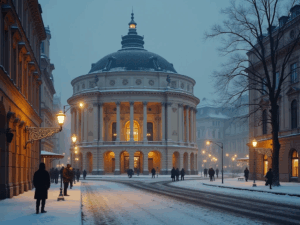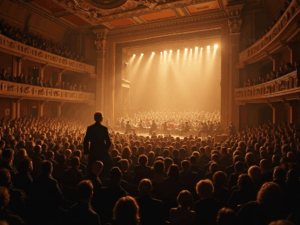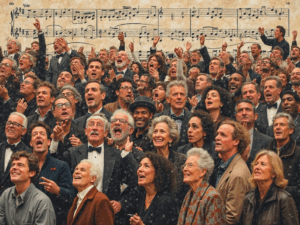# Symphony of Renewal: Life Lessons from Beethoven’s Ninth Premiere on May 7
History, with all its grandeur and pain, is replete with moments that continue to transform the way we view art, life, and our own inner struggles. One such monumental moment is the premiere of Ludwig van Beethoven’s Ninth Symphony on May 7, 1824. Over two centuries have passed since that fateful day at Vienna’s Theater am Kärntnertor, yet the ripple effects of that event remain tangible in the realms of music, culture, and even our personal lives. In this blog, we will journey through the story of Beethoven’s Ninth Symphony, examining how it became a symbol of hope, resilience, and transformation—and why its legacy can serve as a beacon to help you find creative renewal and reclaim your own power in times of adversity.
## I. The Historical Stage: May 7, 1824 in Vienna
On May 7, 1824, while much of Europe was still grappling with the aftermath of political upheavals and social change, a small theatre in Vienna was about to witness an event that would transcend the bounds of time and geography. Beethoven’s Ninth Symphony premiered at the Theater am Kärntnertor—a venue that, on that wintry May day, became the cradle of an extraordinary artistic revolution.
Vienna, a city famed for its imperial grandeur and rich artistic traditions, had already nurtured some of the world’s finest musicians and composers. Yet, on this May afternoon, as the lights dimmed in the modest theatre and a hush fell over the expectant audience, none could have predicted the seismic transformation that was about to be unleashed. Aged, nearly deaf, and often misunderstood, Beethoven defied his personal struggles and poured his soul into the Ninth Symphony—a work that would forever change the face of classical music.
This historical event was far more than just a musical performance. It was an act of defiance against the limitations of body and circumstance, a bold proclamation that the human spirit and creative expression can rise above adversity. On that day, Beethoven not only offered the world a masterpiece of sound but also, inadvertently, a timeless lesson in resilience and the power of reinvention.
## II. Beethoven’s Life and the Making of the Ninth Symphony
To truly appreciate the significance of the Ninth Symphony’s premiere, one must understand the man behind the music. Ludwig van Beethoven was no stranger to hardship. Born into a world of constant change, he grew up amid social and political turmoil. Yet, his own personal battleground was perhaps the most profound: his gradual loss of hearing. At a time when communication—and indeed, music itself—depended on auditory clarity, Beethoven’s encroaching silence became both a personal curse and a source of profound creative liberation.
Imagine being a composer whose medium is sound, only to face the cruel irony of losing the very sense that validates his art. Yet, rather than succumbing to despair, Beethoven transformed his adversity into a crucible for creativity. Through immense willpower and a relentless desire to communicate his inner vision, he composed the Ninth Symphony. This work, topped with a final movement that incorporates the human voice—a setting of Friedrich Schiller’s poem “Ode to Joy”—broke new ground by merging symphonic and choral elements in a way never before heard.
The premiere itself was an event of remarkable courage. Even though Beethoven was almost completely deaf, he attended every rehearsal and performance with a spirit that belied his physical limitations. His determination to share his artistic message was as bold as it was humbling. In a manner of speaking, the Ninth Symphony serves as the definitive statement that true creativity is not diminished by setbacks; it is strengthened by them.
## III. A Masterpiece Beyond Music: Cultural and Global Impact
Beethoven’s Ninth Symphony did not simply alter the course of musical history—it instilled in humanity a powerful message of universal brotherhood and hope. Over time, the “Ode to Joy” has been adopted as an anthem of liberation and unity, resonating in protests, celebrations, and commemorations worldwide. It is a tune that calls on people to overcome personal and societal divisions, to embrace differences, and to find common ground amid adversity.
In the decades following its premiere, the symphony’s influence spread far beyond the concert halls of Europe. It found a home on the world stage during tumultuous times—during revolutions, wars, and periods of radical social change. When nations were divided by conflict, Beethoven’s notes served as a reminder that individual voices could unite to create something monumental. His art symbolized the triumph of creativity over despair, a concept that echoes in every era.
Importantly, the Ninth Symphony exemplifies an important truth: when humanity encounters obstacles that seem insurmountable, art and creativity provide pathways towards healing and connection. The resilience demonstrated through Beethoven’s work has transcended time. It reminds us that our own creative expressions—whether through music, writing, visual arts, or any form of personal endeavor—can serve as pivotal tools in the journey toward self-improvement and regeneration.
## IV. Drawing Personal Parallels: What Beethoven’s Story Teaches Us
At first glance, a 300‑year‑old symphony might seem far removed from the everyday trials of modern life. Yet, when we peel back the layers of historical context, we uncover timeless lessons that speak directly to our personal experiences. Many of us face challenges that echo Beethoven’s struggles: moments when obstacles seem insurmountable, and the voices of those around us feel drowned out by self-doubt or despair.
### 1. Overcoming Limitations
Beethoven’s battle with deafness is perhaps his most inspiring personal challenge. Imagine investing your life in a passion—your way of communicating with the world—only to find that a crucial part of that medium is failing. Many of us encounter impediments that seem similarly paralyzing: a career setback, a failing relationship, or even a lingering sense of inadequacy. Beethoven’s life teaches us that limitations need not define us; they can be the very catalysts that force us to think differently, work harder, and ultimately reinvent ourselves.
For the individual, this serves as a clarion call to confront your limitations head-on. When you are faced with a personal challenge, rather than succumbing to defeat, consider the possibility that this obstacle could be transformed into an opportunity. Perhaps it is the moment for you to explore a new skill, to hone an existing talent, or to forge a new path that you had not previously imagined. In every setback lies the possibility for reinvention—if you’re brave enough to pursue it.
### 2. The Power of Persistence and Vision
Imagine hearing the sounds of a symphony that you had hand-crafted, even as your own ears had long ceased to register them. That is the paradox of Beethoven’s Ninth—a masterpiece created in the silent depths of personal agony. His persistence in the face of deafness serves as a potent metaphor for anyone whose voice has ever been stifled by circumstances beyond their control.
For many, the journey toward personal success is marred by setbacks. But like Beethoven, the key is to maintain a clear vision of what you want to achieve, regardless of external obstacles. Every time you face hardships in your career or personal life, remind yourself of the power of persistence. Your vision—your unique contribution to the world—must shine through, even if the path is fraught with challenges. Embrace the struggle as an integral part of your journey toward mastery.
### 3. Embracing Creative Reinvention
The premiere of the Ninth Symphony was more than a musical event; it was a radical act of creative reinvention. Beethoven’s blending of vocal and instrumental music, his willingness to experiment with new forms, and his unyielding dedication to artistic expression have inspired countless artists over the centuries. By challenging conventional boundaries, Beethoven showed the world that innovation often arises from daring acts of creativity.
In our everyday lives, we too have the power to disrupt the status quo. Whether it’s rethinking the way you approach your work, transforming a neglected passion into a vibrant project, or simply altering your perspective on life’s challenges, creative reinvention is always within your grasp. Instead of allowing routine and fear to stifle your creativity, let the spirit of Beethoven’s bold experimentation inspire you to find new ways to express yourself and make your mark on the world.
### 4. Finding Unity in Diversity
Perhaps one of the most enduring legacies of Beethoven’s Ninth Symphony is its message of universal brotherhood. The choral finale—an exuberant celebration of freedom, joy, and human solidarity—resonates as a call for inclusion and collective harmony. In a world that often feels divided by differences, the Ninth stands as a reminder that our shared humanity is the ultimate common denominator.
On a personal level, this message translates into the need for building bridges in our own lives. Whether it’s reaching out to a friend in need, engaging in community initiatives, or simply embracing a more empathetic outlook, the lesson is clear: unity begins with recognizing and celebrating the diversity of our experiences. Your personal growth is not solely an individual pursuit; it is enriched by the connections you forge with those around you. By cultivating empathy, openness, and mutual respect, you can create an environment in which everyone has the chance to rise together.
## V. Transforming Personal Setbacks into Triumph: Practical Lessons
History is not merely an archive of events; it offers us practical blueprints for survival and success. The life and legacy of Beethoven, as seen through the prism of his Ninth Symphony, provide actionable insights for anyone aiming to transcend personal challenges. Here are several steps for transforming life’s setbacks into stepping stones for success:
### 1. Reinterpret Your Limitations
Instead of viewing your limitations as insurmountable obstacles, see them as catalysts for discovery. Just as Beethoven reimagined what was possible despite his deafness, take time to reevaluate the challenges you face. Ask yourself: What could be the hidden opportunity behind this difficulty? Whether it’s learning a new skill, seeking a fresh perspective, or even switching gears completely, recognize that the constraints you encounter might be the very things that force you to innovate.
**Action Step:**
Start by keeping a journal where you document one personal challenge each day and, next to it, list potential opportunities that might arise from overcoming it. This habit of reframing adversity will cultivate resilience and open your mind to creative solutions.
### 2. Stay True to Your Vision
In the face of adversity, it is essential to remain anchored to your vision. Develop a clear understanding of what success and fulfillment mean to you. When obstacles appear—and they inevitably will—focus on the final goal, much like Beethoven did when he composed his symphony despite his physical hardships. Cultivating inner discipline and maintaining a long-term perspective are crucial for turning pain into progress.
**Action Step:**
Set aside time each week to review your long-term goals. Break these goals into manageable steps, and celebrate each small victory along the way. Visual reminders, such as a vision board or inspirational quotes, can help you maintain focus during difficult times.
### 3. Embrace the Process of Creative Reinvention
One of Beethoven’s most striking innovations was his willingness to transform tradition by injecting his unique vision into his work. You, too, can reinvent aspects of your personal and professional life by exploring new passions and challenging old habits. Whether it is starting a side project, engaging in creative writing, or experimenting with art, let the process of creation be your balm for adversity.
**Action Step:**
Choose a creative activity that resonates with you and commit to exploring it regularly. This might be painting, composing music, writing poetry, or even cooking—something that allows you to channel your emotions into creation. Make room in your schedule and treat this creative practice as an essential part of your personal growth regimen.
### 4. Cultivate a Supportive Community
No great symphony is created in isolation. Beethoven was part of a vibrant network of patrons, fellow musicians, and innovators who, despite the isolating effects of his deafness, provided him with encouragement and collaboration. In your journey, seek out a community that inspires and supports your endeavors. The collective energy of like-minded individuals can help turn personal setbacks into shared victories.
**Action Step:**
Join or form a group—online or in-person—that revolves around your interests, be it music, art, literature, or professional development. Engage with these communities regularly, share your struggles as well as your successes, and allow their support to amplify your own resilience. The strength of community can often be the difference between stagnation and breakthrough.
### 5. Transform Setbacks into a Source of Inspiration
Beethoven’s Ninth Symphony is a testament to the notion that great art—and by extension, great personal transformation—often arises from the depths of despair. Look at every setback not as a final chapter but as a prelude to an inspiring new movement. Let the adversities you face serve as raw material for a creative masterpiece of your own making.
**Action Step:**
Whenever you encounter a major setback, commit to writing a reflective piece on what you learned from the experience. This might be in the form of a blog post, a personal letter, or even a poem. Over time, you will build a portfolio of insights that not only document your journey but also inspire you during future challenges.
### 6. Reconnect With the Transformative Power of Art and Music
Music, in particular, has a unique way of reaching into the depths of human emotion and lifting us up. Beethoven’s Ninth Symphony has inspired countless individuals to embrace hope, joy, and a sense of unity. Even if you are not a musician, immerse yourself in art in all its forms—attend concerts, visit museums, or simply listen to your favorite pieces. Allow these experiences to remind you of the beauty and strength inherent in creative expression.
**Action Step:**
Create a playlist that includes not only Beethoven’s masterpieces but also tracks that inspire you personally. Spend time each week in a quiet space where you can listen intentionally, letting the soundscapes fill you with calm and motivation. This ritual can become a powerful reminder of the universal language of resilience and hope.
## VI. The Enduring Legacy: Embracing a Personal Renaissance
The premiere of Beethoven’s Ninth Symphony on May 7, 1824, stands as a testament to the transformative power of art in the face of adversity. It is a reminder that even when the world around us crumbles, the creative spirit has the power to rebuild and renew. Beethoven’s willingness to channel his personal struggles into one of the most profound musical achievements in history teaches us that no setback is final and that every ending contains the promise of a new beginning.
Today, when you face obstacles in your career, relationships, or personal aspirations, consider the story of Beethoven—a man who, despite overwhelming odds, chose to listen to the voice of his inner vision and transform silence into a universal symphony. His life urges us not to be defined by our limitations but to convert them into the fuel that propels us forward.
Imagine your own life as an unfinished symphony. Every setback, every challenge, every heartache is a note that you can learn to transform into something beautiful. Whether you are struggling with self-doubt, confronting a career setback, or weathering the storms of personal loss, remember that these moments are not the end of your concerto, but a prelude to a renewed and resplendent composition.
In the same way that the Ninth Symphony inspires jubilation and unity through its choral finale, let your own journey be one of rising above division and despair. Let it be a reminder that you, too, can create a masterpiece out of the fragments of your past. By embracing creativity, seeking out supportive communities, and remaining steadfast in your pursuit of a higher vision, you can transform life’s cacophonies into melodies of hope and triumph.
As you move forward, let the legacy of Beethoven’s bold experimentation and tenacity inspire you to break free from old constraints. Honor the struggles that have shaped you and view them as stepping stones toward the realization of your greatest potential. Each day is an opportunity to rewrite the score of your life—infusing it with resilience, passion, and the unwavering belief that you can shape your destiny.
## VII. Conclusion: Your Personal Symphony of Transformation
The triumph of Beethoven’s Ninth Symphony is not confined to the annals of history—it lives on every time someone dares to transform a personal setback into a source of creative power. On May 7, as you reflect on this historical milestone, may it also serve as a call to embrace your own moments of vulnerability, to listen to the quiet voice of your inner genius, and to rise up with renewed determination.
Let today be the day you choose to turn your own challenges into the symphony of your life. Accept that setbacks are not endpoints but invitations to grow, innovate, and begin anew. Whether you’re embarking on a new creative project, redefining your professional path, or simply choosing to be kinder to yourself, remember that every note in your life’s composition is an essential part of your unwritten masterpiece.
As you take these lessons to heart, know that the spirit of Beethoven—that relentless, brilliant, and transformative spirit—lives within you. Embrace your limitations as opportunities, persist through the noise of self-doubt, and let your creative light shine through every adversity. In doing so, you not only honor the legacy of one of the greatest musical geniuses of all time but also carve out a future filled with passion, purpose, and endless possibility.
Let the premiere of Beethoven’s Ninth Symphony stand as both a historical beacon and a personal signpost: that even in the face of overwhelming darkness, we have the power to compose an enduring, jubilant symphony of renewal—a symphony that unites us all in the shared beauty of our humanity.
May this story inspire you to fill your life with music, art, hope, and the audacity to dream beyond the present. In every moment of despair, may you find the courage to lift your eyes to the stars and, like Beethoven, transform silence into an everlasting song.
By embracing the resonant echoes of history, you take ownership of your own narrative. Today, as you reflect on the wondrous triumph of Beethoven’s Ninth Symphony, remember that your life, too, is a canvas awaiting the bold strokes of transformation. In each challenge lies an opportunity for creative rebirth, in each setback a chance to innovate, and in every tear a seed for a brighter tomorrow.
This is your invitation to create your personal symphony—a harmonious blend of struggle, persistence, imagination, and unity. With every step you take towards your dreams, you contribute to a legacy that is as timeless and transformative as the great works of the past.
Embrace this day, let its inspiration guide you, and know that your inner symphony can resonate far beyond what you ever imagined. Today is the beginning of your grand opus. Welcome to your personal renaissance.
May the lessons of May 7, 1824, and the miracle of Beethoven’s Ninth Symphony empower you to live a life full of creative passion, unyielding courage, and transformative renewal. Let history remind you that even in the face of adversity, your inner music can forever change the world.

